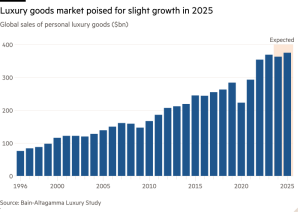Syrians in Europe resist calls to return home

Growing numbers of politicians in Europe say it is time for more than a million Syrian refugees in the continent to return to their homeland after the fall of dictator Bashar al-Assad. Syrians say it is more complicated than that.
Those who fled the 13-year civil war pointed to the political uncertainty after a rebel offensive swept into Damascus over the weekend — and the damage to infrastructure and housing that has made many parts of the country uninhabitable.
“Everyone I know wants to wait and see,” said Omar al-Hajjar, a 54-year-old mason from Aleppo who is one of the roughly 970,000 Syrians now living in Germany. “The situation in Syria is very tough.”
Germany became the EU’s largest host of Syrians after Angela Merkel’s 2015 decision to open the doors to about 1mn asylum seekers, mostly from the Middle East. Migration is expected to feature heavily in campaigning ahead of the country’s snap elections in February.
Within hours of the fall of Assad, politicians from the centre-right Christian Democrats (CDU) and far-right Alternative for Germany (AfD) were saying it was time for Syrians to start to consider returning home.
Al-Hajjar, who was relocated to Berlin with his wife and five sons by the UN in 2019 after five years of living in Turkey, used to own two properties in his home town. But both were flattened during bombing by Assad’s government and its Russian allies. His extended family has been displaced across Syria and Turkey.
While he is jubilant about the end of the more than 50-year Assad dynasty, he said the country “needs a government, needs institutions” before people can contemplate returning.

Germany on Monday was the first country to announce it was suspending asylum applications from Syrian nationals, a move quickly replicated by the UK, France, Italy and other EU countries.
Austria said it would also organise a “repatriation and deportation programme”. Jimmie Åkesson, leader of the far-right Sweden Democrats — which supports the rightwing government in parliament — said Syrians “should see this as a good opportunity to go home”.
The tone of the debate was criticised by Pro Asyl, a Frankfurt-based advocacy group, which called on politicians to “take responsibility and show solidarity with the refugees, instead of using them politically”.
Some Syrians are eager to return as soon as possible, including members of the exiled activist community who want to shape the future of the country.
Joumana Seif, a lawyer and rights campaigner who has lived in Berlin since 2013, said many in her circles were desperate to return immediately. “Among civil society, for a lot of people, the first question is: when are you going back?”
Seif, 54, voiced nervousness about the dominant role being played by a former al-Qaeda offshoot, Hayat Tahrir al-Sham, the Islamist movement that spearheaded the offensive against Assad and is the most powerful of the rebel forces.
Seif said she wanted to “fight for our dream to be completed: a democratic modern country, with human rights protection and equality for everyone, including women”.
But first she must find a way to travel, when she has neither a valid Syrian passport nor a German one.
In Cyprus, a group of 60 Syrians withdrew their asylum claims, citing the “new and hopeful day” for their homeland, said Cypriot deputy minister for migration Nikolas Ioannides.

But other Syrians in Cyprus are reluctant to return. “It’s a grave mistake,” said Thabet Abbarah, president of the Free Syrian Community in Cyprus. “At the moment, there is no state, no police, no army, and Israel has taken half of Syria.” Abbarah, who has lived in Cyprus for 32 years, said “even if we go back, we would have no place to stay. We need time — lots of it”.
In Rome, Syrians working at HummusTown — a non-profit restaurant run by refugees making traditional food — said they were still in shock, with their joy over Assad’s departure tempered by apprehension about what might lie ahead.
Syria has been shattered by the years of civil war, the state is bankrupt and it is unclear how the rebel groups will establish governance structures.
“It’s a bit premature to tell you that any of them want to go back,” said Shaza Saker, the restaurant’s founder. She said Christian refugees were particularly nervous. “Why would you go back now? To the unknown?”
In Germany, those with children, in particular, said they could not impose yet more upheaval on them. Many families have been displaced multiple times during 13 years of conflict.
“If I didn’t have kids I would return straight away,” said Ammar al-Rifai, who works on a counter selling olives, pickles and cheeses at a grocery store in Berlin’s Neukölln district. “I am very, very happy about the fall of the regime.”
But al-Rifai’s two children, aged 9 and 12, were settled in school and had “soaked up German” like a sponge after moving from Egypt in 2020, having fled Syria five years earlier. It would be difficult to uproot them again, he said.
That was echoed by Marha Farhan, 24, who was out shopping for groceries with her three-year-old daughter and her newborn baby. “We would definitely like to go back at some point,” she said, adding that she had found it hard to get used to life in Germany and had struggled to learn German. “But it is not safe right now.”
Only about 160,000 Syrians in Germany have a German passport, leaving the rest vulnerable to a possible revocation of their refugee status in future — although many of them also have pending citizenship applications.

Thomas Oberhäuser, a lawyer and chair of the German Bar Association’s committee on migration law, said the German government would first have to show that Syria was safe, with rights protection for ethnic and religious groups. It was “absolutely not the right time” to discuss this, he said.
He noted that Germany had for the past 18 months been sending hundreds of Iraqis back to Iraq despite volatile, unstable conditions there.
Some also warned of unintended consequences in Germany, where there are labour shortages. The German Hospital Federation and the German Association of Specialist Doctors (SpiFa) pointed out that Syrians make up the biggest number of foreign doctors in the country.
“These people make an important contribution to healthcare in Germany,” SpiFa told the news magazine Der Spiegel. “Their departure would have a noticeable impact on the German health system.”
Additional reporting by Richard Milne in Oslo and Laura Dubois in Brussels
#Syrians #Europe #resist #calls #return #home




